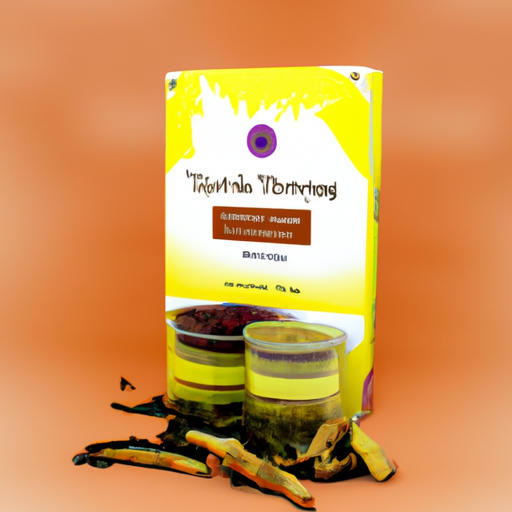I’ve recently become enamored with the incredible health advantages of turmeric tea, and I just can’t seem to get enough! Turmeric, a spice that’s been utilized in traditional Ayurvedic and Chinese medicinal practices for millennia, serves to combat numerous health issues. The main compound in turmeric, curcumin, boasts impressive anti-inflammatory and antioxidant effects that can enhance cognitive abilities, reduce the chances of cardiovascular diseases, and may even hinder the development of cancer.
If you’re like me and want to incorporate turmeric tea into your daily routine, you may be wondering where to buy it. In this article, I will share some tips on where to find high-quality turmeric tea and how to choose the right type for your needs.
Whether you prefer shopping at health food stores or online retailers, there are many options available that cater to different tastes and budgets. So let’s dive in and explore the wonderful world of turmeric tea together!
Key Takeaways
- Turmeric tea can be purchased at health food stores, large chain stores, online retailers, specialty herbal tea websites, tea shops, cafes, and farmers markets.
- Look for organic and fair trade options and check the ingredients list when purchasing turmeric tea.
- Loose leaf turmeric tea may be more cost-effective in the long run and popular brands for loose leaf turmeric tea include Rishi, Numi, and Mountain Rose Herbs.
- Turmeric tea can be prepared at home by boiling water and adding fresh grated turmeric root or ground turmeric powder.
The Health Benefits of Turmeric Tea
You’ll be amazed at how turmeric tea can improve your overall health and well-being! Not only is it a delicious and warming beverage, but it also boasts numerous health benefits.
Turmeric tea is packed with antioxidants and anti-inflammatory properties that can help reduce inflammation in the body, which has been linked to a variety of chronic diseases such as cancer, heart disease, and Alzheimer’s.
One of my favorite things about making turmeric tea is experimenting with different recipes. There are so many variations out there that you’re sure to find one that suits your taste buds. Some popular ingredients include ginger, honey, cinnamon, black pepper, and lemon juice. You can even add a splash of coconut milk for added creaminess.
In addition to its anti-inflammatory properties, drinking turmeric tea on a regular basis may also help boost your immune system and improve digestion. So why not give it a try? You might just discover a new favorite drink that not only tastes great but also helps keep you healthy.
And if you don’t feel like making it yourself, many health food stores now carry pre-made versions for your convenience!
Health Food Stores
I love shopping for health foods at local health food stores. They offer a wide variety of organic and natural products that aren’t always available at large chain stores.
In addition, the staff is usually very knowledgeable and can help me find exactly what I need to support my healthy lifestyle.
Local Health Food Stores
Local health food stores carry a variety of turmeric tea products, with sales expected to reach $2.3 billion globally by 2025. As someone who enjoys the health benefits of turmeric tea, I appreciate having local suppliers that offer a range of pricing options to fit my budget.
Here are some things to consider when looking for turmeric tea at your local health food store:
- Look for organic and fair trade options: Many health food stores carry brands that prioritize ethical sourcing practices.
- Check the ingredients list: Some turmeric teas contain added sweeteners or flavorings, so make sure to read the label if you have specific dietary restrictions or preferences.
- Consider loose leaf vs. teabags: Loose leaf tea may be more cost-effective in the long run if you have a reusable strainer or infuser.
- Ask about bulk discounts: If you’re a regular turmeric tea drinker, purchasing in bulk can save you money over time.
- Don’t be afraid to try something new: Health food stores often carry unique blends and varieties that you may not find at larger retailers.
Next up, let’s explore some options for finding turmeric tea at large chain stores.
Large Chain Stores
When shopping at large chain stores, it can be challenging to find unique and ethically sourced options for your health needs. However, when it comes to turmeric tea, some of the larger chains do carry options that are worth considering.
For example, Walmart offers a variety of turmeric teas including organic options from brands such as Traditional Medicinals and Yogi Tea. While the pricing may not be as competitive as local health food stores or online retailers, it’s still reasonable and often more affordable than specialty shops.
Another option for finding turmeric tea at chain stores is Target. They offer several different brands such as Numi Organic Tea and Bigelow Benefits Turmeric Chili Matcha Green Tea. The prices at Target are comparable with those found at Walmart.
It’s important to note that while these large chain stores may not have the same level of selection or quality as specialty shops, they do provide convenient access to turmeric tea for those who don’t have other options nearby. As we move into exploring online retailers for purchasing turmeric tea, it’s important to keep in mind the availability and pricing comparison from chain stores.
Online Retailers
As someone who loves drinking herbal tea for its health benefits, I’ve found that online retailers offer a vast array of options to choose from.
Popular online retailers like Amazon and Walmart have a wide variety of herbal teas available at competitive prices.
Additionally, there are specialty herbal tea websites like Teavana and Adagio Tea that offer unique blends and flavors not commonly found in other stores.
Popular Online Retailers
You can easily find turmeric tea on popular online retailers like Amazon or Walmart. These platforms offer a wide range of options from top-rated brands, including Yogi Tea and Traditional Medicinals. They also provide customer reviews, which can help you make an informed decision about which product to purchase.
When browsing through these online retailers, keep in mind that the prices may vary, and it’s important to compare them across different websites. Additionally, be aware of shipping costs and delivery times when making your purchase.
If you’re looking for a larger selection or more specialized products, consider checking out specialty herbal tea websites like Teavana or Harney & Sons.
Specialty Herbal Tea Websites
For a wider variety of herbal teas, specialty herbal tea websites like Teavana and Harney & Sons are the way to go. These websites offer unique turmeric blends that you won’t find in your local grocery store or even popular online retailers. They have a wide range of turmeric teas, from spicy chai blends to sweet vanilla flavors.
One thing to keep in mind when shopping on these specialty websites is that prices may be higher than what you’re used to paying for tea. However, the extra cost is often worth it for the quality and unique flavors you’ll get with these special blends. Plus, many of these sites offer free shipping deals or discounts on bulk orders.
So if you’re looking for something truly special and different when it comes to your turmeric tea selection, consider browsing through some of these specialty herbal tea websites.
Moving onto tea shops and cafes…
Tea Shops and Cafes
If you’re looking for a cozy spot to enjoy a warm cup of turmeric tea, there are plenty of tea shops and cafes around town that offer this delicious beverage. Don’t let the cat out of the bag though, some places might charge an arm and a leg for it!
However, if you do your research and look for the right places, you can find affordable options that won’t break the bank. When it comes to finding turmeric tea in tea shops and cafes, it’s important to keep in mind that they might offer various blends with different ingredients.
Some blends might have added spices like ginger or cinnamon, while others may be mixed with black or green tea. It’s also worth asking about their brewing methods – some places might use traditional pots to brew their teas, while others may use more modern techniques like infusers or teapots.
If you’re lucky enough to stumble upon a cafe or tea shop that offers turmeric tea at an affordable price, make sure to savor every sip! But if you’re looking for even more affordable options or want to try making your own turmeric tea at home, farmers markets are another great place to check out.
Farmers Markets
At the farmers market, vendors sell fresh produce and homemade goods. It’s a great place to find unique and locally sourced items. When it comes to turmeric tea, visiting the farmers market is an excellent way to support local businesses while reaping the benefits of this powerful ingredient.
Here are four reasons why you should consider getting your turmeric tea from a farmers market:
-
Supporting local: By purchasing from a local vendor, you’re supporting small businesses in your community.
-
Freshness: The turmeric used for making tea is fresher since it’s often grown locally and sold soon after harvest.
-
Organic options: Some vendors use organic farming practices, providing healthier options for consumers concerned about chemicals in their food.
-
Meet the farmer: You can meet the people who grow your food and ask them questions about how they produce it.
Getting your turmeric tea at a farmers market is not only beneficial for you but also for the farmers who get to showcase their products directly to consumers without intermediaries involved.
Now that we know about some of the advantages of buying this product at a farmers’ market, let’s take a closer look at what factors need consideration when choosing the right brand.
Choosing the Right Brand
Finding the perfect brand of golden elixir can be a delightful adventure, as each bottle has its unique flavor and aroma that transports you to the fields where it was crafted.
But with so many options available in the market today, how do you choose the right brand of turmeric tea? The answer lies in two essential factors: brand reputation and customer reviews.
To ensure that you’re getting high-quality turmeric tea, it’s important to research the different brands available. Look for well-established companies with a good reputation for producing organic and ethically sourced products. A reputable brand will have detailed information about their sourcing methods, production processes, and ingredients on their website or label.
Another great way to gauge the quality of a turmeric tea brand is by reading customer reviews. Check out what other people are saying about the product before making your purchase. If a significant number of customers report positive experiences with a particular brand, it’s likely that they produce consistently good quality teas. On the other hand, if there are numerous complaints about taste or quality issues, it might be best to avoid that specific brand.
Choosing the right type of turmeric tea is an essential step towards enjoying this flavorful beverage’s health benefits fully. Keep reading to learn more about how to select between loose-leaf or bagged tea and what kind of additives or flavors are available in stores near you!
Choosing the Right Type of Turmeric Tea
When it comes to choosing the right type of turmeric tea, there are a few key points to consider. First, you may want to decide between loose leaf and tea bags. Loose leaf allows for more control over the strength and flavor of your tea, while tea bags offer convenience.
Additionally, you may want to consider whether you prefer flavored or unflavored turmeric tea, as well as any other ingredients that may be included in the blend. By taking these factors into account, you can choose a turmeric tea that best suits your taste preferences and lifestyle needs.
Loose Leaf vs. Tea Bags
You’ll love the rich and bold flavor of loose leaf turmeric tea, which infuses more deeply than tea bags. When it comes to choosing between loose leaf vs. tea bags, there are a few quality differences to consider.
Here are some things to keep in mind as you shop:
- Popular brands: Some popular brands for loose leaf turmeric tea include Rishi, Numi, and Mountain Rose Herbs.
- Health benefits: Loose leaf turmeric tea contains more antioxidants and anti-inflammatory compounds than its bagged counterpart.
- Local availability: You may have an easier time finding turmeric tea bags at your local grocery store or health food store than loose leaf.
- Buying in bulk: If you’re a regular drinker of turmeric tea, buying in bulk can save you money in the long run.
- Tea accessories: Brewing loose leaf requires additional equipment like a strainer or infuser basket.
If you’re looking for convenience over flavor depth, however, tea bags might be your best bet.
In the next section, we’ll explore another aspect of choosing the right type of turmeric tea: flavored vs. unflavored.
Flavored vs. Unflavored
Indulge your taste buds with the delicious and unique flavors of flavored turmeric tea, adding a touch of excitement to your daily routine.
Flavored turmeric teas come in a variety of flavors such as ginger, cinnamon, cardamom, and even vanilla. These added flavors not only make drinking turmeric tea more enjoyable but also provide additional health benefits.
For example, ginger is a natural anti-inflammatory agent that can help reduce muscle pain and soreness. Cinnamon has been shown to improve blood sugar control and lower cholesterol levels. Cardamom has antioxidant properties that may help protect against chronic diseases like cancer and heart disease. Vanilla is known for its calming effects on the mind and body.
So not only do these flavored turmeric teas taste great, but they also have added health benefits that can improve your overall well-being.
Now let’s move on to other ingredients you can add to enhance the flavor and health benefits of your turmeric tea.
Other Ingredients
Spice up your daily turmeric tea with other ingredients that can enhance its taste and nutritional value. Other spices like ginger, cinnamon, and cardamom not only add flavor but also have health benefits of their own.
Ginger is known for its anti-inflammatory properties, while cinnamon is a great antioxidant and helps regulate blood sugar levels. Cardamom aids digestion and has antimicrobial properties.
Adding these ingredients can create a unique blend of flavors that will make your turmeric tea even more enjoyable. You can experiment with different combinations to find the perfect mix for you. Not only will it be delicious, but it will also provide additional nutrients to help you reap all the turmeric tea benefits.
Next, let’s dive into how to prepare your own cup of turmeric tea at home without relying on store-bought options.
How to Prepare Turmeric Tea
To prepare turmeric tea, start by boiling water and adding fresh grated turmeric root or ground turmeric powder to the pot. Allow it to simmer for about 10 minutes before adding any other ingredients.
Turmeric tea benefits are plentiful, including anti-inflammatory properties and aiding in digestion. There are also many recipe variations you can try to change up the flavor profile.
To prepare your perfect cup of turmeric tea, follow these simple steps:
- Add a pinch of black pepper to increase the absorption of curcumin in turmeric.
- Add honey or lemon juice for added flavor and health benefits.
- For a creamier taste, add coconut milk or almond milk.
- Experiment with other spices like cinnamon, ginger or cardamom.
Once your turmeric tea is ready, pour it into a mug and enjoy! Storing turmeric tea is easy; simply transfer any leftover tea into an airtight container and store it in the refrigerator for up to three days. Reheat as necessary and enjoy all the health benefits that come with this delicious beverage.
Storing Turmeric Tea
When it comes to storing turmeric tea, proper techniques are essential to ensure its long-lasting freshness and potency. As someone who enjoys a cup of turmeric tea regularly, I’ve learned that keeping it properly stored can make all the difference in both taste and health benefits.
In this discussion, we’ll explore the best practices for storing turmeric tea. We’ll also cover its shelf life and how to tell if it’s gone bad.
Proper Storage Techniques
To keep your turmeric tea fresh and flavorful, it’s important to store it properly using a sealed container in a cool, dry place. Here are some tips for proper storage:
- Keep the tea away from direct sunlight and heat sources, such as stoves or ovens.
- Use an airtight container that is specifically designed for storing tea to keep out moisture and air.
- Store the container in a cupboard or pantry that is not exposed to high humidity levels.
- Avoid storing the tea near strong-smelling items like spices or cleaning products, as they can affect the flavor of the tea.
- Check on your stored turmeric tea regularly to make sure there are no signs of spoilage or mold.
Proper storage techniques can help extend the shelf life of your turmeric tea. However, even with optimal storage conditions, teas can begin to lose their potency after several months.
In our next section, we’ll discuss how long you can expect your turmeric tea to last before it starts losing its quality.
Shelf Life
Now that we have discussed proper storage techniques, let’s talk about the shelf life of turmeric tea. Preserving freshness is crucial to ensure that turmeric tea maintains its flavor and health benefits. Like any other food or beverage, turmeric tea has an expiration date. However, the shelf life of turmeric tea depends on several factors such as how it was processed, packaged, and stored.
To help you understand better, here’s a table showing the estimated shelf life of different types of turmeric teas:
| Type of Turmeric Tea | Shelf Life |
|---|---|
| Loose leaf | 6 – 8 months |
| Tea bags | 10 – 12 months |
| Instant mix | Up to 18 months |
It is important to note that these are just estimated shelf lives and may vary depending on various factors like temperature and humidity. To preserve the freshness of your turmeric tea for a longer time, store it in an airtight container away from direct sunlight and heat sources.
Understanding the shelf life of turmeric tea is essential in maintaining its quality and effectiveness. Always check the expiration date before purchasing or consuming any type of turmeric tea product. Remember to store your turmeric teas properly to prolong their freshness and enjoy their numerous benefits for a longer period. Moving forward, let’s explore our final thoughts and recommendations for buying high-quality turmeric teas.
Final Thoughts and Recommendations
Overall, you can’t go wrong with trying out some turmeric tea – it’s a delicious and healthy addition to your routine. As the saying goes, ‘an apple a day keeps the doctor away,’ and adding turmeric tea to your diet may just do the trick!
Not only is turmeric tea easy to prepare, but it also boasts multiple health benefits. It has potent anti-inflammatory properties that aid in reducing pain and inflammation throughout the body. Additionally, it helps boost immunity and improve brain function.
When brewing turmeric tea, there are a few tips to keep in mind for optimal taste and results. First off, be sure to use high-quality turmeric powder or fresh turmeric root for maximum flavor and nutritional value. Secondly, always pair it with black pepper as this enhances curcumin absorption in the body by up to 2000%. Lastly, add honey or lemon juice for an added kick of flavor.
There are many variations of turmeric tea recipes available online that cater to different preferences such as adding ginger or cinnamon. Experimenting with these variations can be fun while still reaping all the health benefits that come along with drinking this golden beverage daily.
So why not give it a try today? Your taste buds and body will thank you!
Frequently Asked Questions
Are there any potential negative side effects of drinking turmeric tea?
As someone who regularly drinks turmeric tea, I can confidently say that there are numerous benefits to consuming this delicious beverage. Turmeric is known for its anti-inflammatory properties and has been shown to help with a variety of health issues, including reducing joint pain and improving digestion.
Additionally, turmeric contains antioxidants that can help protect against various diseases. That being said, it’s important to note that consuming too much turmeric can potentially have negative side effects, such as an upset stomach or even kidney stones in rare cases. To avoid these issues, it’s recommended to stick to a moderate amount of turmeric (around 1 teaspoon per day) and consult with a healthcare professional if you have any concerns.
If you’re interested in trying out turmeric tea for yourself, there are plenty of easy recipes available online that you can use to make your own at home!
Can turmeric tea be consumed by pregnant or nursing women?
As a healthcare professional, I’d advise pregnant or nursing women to consult with their doctor before consuming turmeric tea.
While there is limited research on the effects of turmeric tea and fertility, some studies suggest that high doses of curcumin (the active ingredient in turmeric) may have anti-fertility effects in both males and females.
Additionally, postpartum recovery is a delicate time for mothers and it’s important to prioritize nutrition and hydration. Turmeric has been shown to have anti-inflammatory properties which may help with postpartum healing, but again, it’s best to discuss any dietary changes with your healthcare provider first.
Overall, while turmeric tea can be a healthy addition to most people’s diets in moderation, it’s important for pregnant or nursing women to seek professional advice before consuming it regularly.
How much turmeric should be used to make a cup of tea?
When it comes to making a cup of turmeric tea, the amount of turmeric used can vary depending on personal taste preferences. However, a general rule of thumb is to use about one teaspoon of ground turmeric per cup of water.
It’s important to note that using too much turmeric can result in a bitter taste and overpowering flavor. Experimenting with different varieties of turmeric, such as Alleppey or Madras, can also add depth and complexity to the flavor profile.
Additionally, incorporating other ingredients like ginger, honey, or lemon can create delicious flavor combinations while also providing added health benefits.
Overall, making turmeric tea at home is an easy and practical way to incorporate this superfood into your daily routine.
Does the quality of the turmeric used in tea affect its health benefits?
When it comes to making turmeric tea, the quality of the turmeric used can definitely affect its health benefits. Turmeric contains a compound called curcumin, which is responsible for many of its medicinal properties. However, not all turmeric varieties contain the same amount of curcumin.
In general, higher quality turmeric will have a higher concentration of curcumin and therefore provide more health benefits. Additionally, brewing methods can also impact the potency of the tea. Some experts recommend adding black pepper or coconut oil to enhance absorption of curcumin into the body.
Ultimately, when choosing a turmeric variety for tea making purposes, it’s important to do some research and choose one that has been shown to have high levels of curcumin and pair it with a brewing method that maximizes its potential health benefits.
Can turmeric tea be consumed cold or is it best served hot?
Let’s face it, sometimes we don’t want a piping hot beverage. Good news! Turmeric tea can absolutely be consumed cold and still offer the same health benefits as when served hot.
The flavor profile may vary slightly depending on the preparation method and additional ingredients used, but it will still have that signature earthy, slightly spicy taste. Some people even prefer it cold as a refreshing alternative to sugary drinks.
Experiment with different variations, like adding lemon or honey, to find your perfect cup of iced turmeric tea. So go ahead and enjoy this versatile drink however you please!
Conclusion
I hope this article has helped you understand the health benefits of turmeric tea and where to buy it. Whether you choose to purchase from a health food store, online retailer, tea shop, or farmers market, make sure to select a high-quality product that’s pure and free from additives.
As for me, I’ve recently discovered the wonders of turmeric tea when my friend recommended it for my persistent joint pain. After regularly drinking turmeric tea for a few weeks, I noticed significant improvement in my mobility and overall well-being. Now, I always keep a stash of turmeric tea bags in my pantry for those days when I need an extra boost of anti-inflammatory goodness.
Give it a try – your body will thank you!










